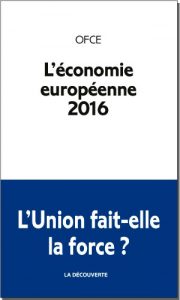


Legal fiction, ideology and global governance
2 June 2016
Why does the State want to govern our behaviour?
4 June 2016
L’économie européenne 2016, a French Economic Observatory (OFCE) collective work, edited by Jérôme Creel, helps grasp the magnitude of the crisis that European institutions are currently experiencing, especially in terms of legitimacy of action and efficiency. Starting with the ambitious historical project of the Economic Community in 1957, it analyzes integration policy choices, especially monetary ones, and difficulties encountered as a result of the international financial crisis. It contributes to the debate over the future role of the European project in addressing challenges linked to growth, unemployment and inequality reduction.
The goal of L’économie européenne 2016 is to offer an accessible and rigorous assessment of the European economy by presenting the state of the economy and of common policies, as well as major trends and contemporary issues.
The Greek crisis demonstrated European governance failure, but what lessons can be drawn from the failure and how can both budgetary and monetary governance be improved? This raises many complex questions: should competitiveness gaps and trade imbalances be controlled, and if so, how? Should budgetary rules be changed? Will a European investment plan suffice to jumpstart the economy, and will it lead to better coordination of European policies? Should the EU see climate change as an opportunity to renew its integration project?
Bibliographical references and many charts and graphs enhance the book.
*Authors: Céline Antonin, Christophe Blot, Gérard Cornilleau, Jérôme Creel (ed.), Guillaume Daudin, Anne-Laure Delatte, Fabien Labondance, Eloi Laurent, Jacques Le Cacheux, Mathilde Le Moigne, Xavier Ragot, Francesco Saraceno, Vincent Touzé, Sébastien Villemot.



